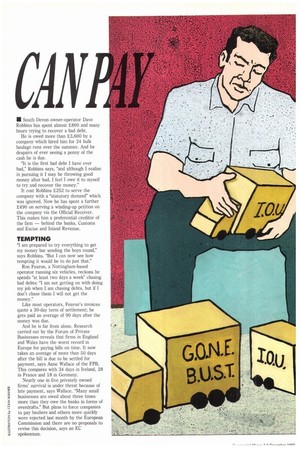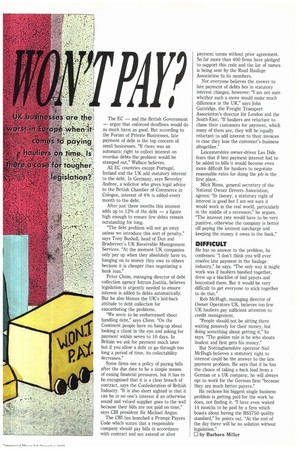CA
Page 34

Page 35

If you've noticed an error in this article please click here to report it so we can fix it.
• South Devon owner-operator Dave Robbins has spent almost £800 and many hours trying to recover a bad debt.
He is owed more than £3,600 by a company which hired him for 24 bulk haulage runs over the summer. And he despairs of ever seeing a penny of the cash he is due.
"It is the first bad debt I have ever had," Robbins says, and although I realise in pursuing it I may be throwing good money after bad, I feel I owe it to myself to try and recover the money."
It cost Robbins £252 to serve the company with a "statutory demand" which was ignored. Now he has spent a further ,490 on serving a winding-up petition on the company via the Official Receiver. This makes him a preferential creditor of the firm — behind the banks, Customs and Excise and Inland Revenue.
TEMPTING
"I am prepared to try everything to get my money bar sending the boys round," says Robbins. "But I can now see how tempting it would be to do just that."
Ron Fearon, a Nottingham-based operator running six vehicles, reckons he spends "at least two days a week" chasing bad debts: "I am not getting on with doing my job when I am chasing debts, but if I don't chase them I will not get the money."
Like most operators, Fearon's invoices quote a 30-day term of settlement; he gets paid an average of 90 days after the money was due.
And he is far from alone. Research carried out by the Forum of Private Businesses reveals that firms in England and Wales have the worst record in Europe for paying bills on time. It now takes an average of more than 50 days after the bill is due to be settled for payment, says Anne Wallace of the FPB. This compares with 34 days in Ireland, 28 in France and 18 in Germany.
Nearly one in five privately owned firms' survival is under threat because of late payment, says Wallace. "Many small businesses are owed about three times more than they owe the banks in forms of overdrafts." But plans to force companies to pay hauliers and others more quickly were rejected last month by the European Commission and there are no proposals to revise this decision, says an EC spokesman. The EC — and the British Government — argue that enforced deadlines would do as much harm as good. But according to the Forum of Private Businesses, late payment of debt is the top concern of small businesses. "If there was an automatic right to collect interest on overdue debts the problem would be stamped out," Wallace believes.
All EC countries except Portugal, Ireland and the UK add statutory interest to the debt. In Germany, says Beverley Andree, a solicitor who gives legal advice to the British Chamber of Commerce in Cologne, interest of 4% is added every month to the debt.
After just three months this interest adds up to 12% of the debt — a figure high enough to ensure few debts remain outstanding for long.
"The debt problem will not go away unless we introduce this sort of penalty," says Tony Bushell, head of Dun and Bradstreet's UK Receivable Management Services. "At the moment UK companies only pay up when they absolutely have to, hanging on to money they owe to others because it is cheaper than negotiating a bank loan."
Peter Chinn, managing director of debt collection agency Intrum Justitia, believes legislation is urgently needed to ensure interest is added to debts automatically. But he also blames the UK's laid-back attitude to debt collection for exacerbating the problems.
"We seem to be embarrassed about handling debt," says Chinn. "On the Continent people have no hang-up about looking a client in the eye and asking for payment within seven to 10 days. In Britain we ask for payment much later but if you allow a debt to go through too long a period of time, its collectability decreases."
Some firms see a policy of paying bills after the due date to be a simple means of easing financial pressures, but it has to be recognised that it is a clear breach of contract, says the Confederation of British Industry. "It is also short sighted in that it can be in no one's interest if an otherwise sound and valued supplier goes to the wall because their bills are not paid on time," says CBI president Sir Michael Angus.
The CBI has launched a Prompt Payers Code which states that a responsible company should pay bills in accordance with contract and not extend or alter payment terms without prior agreement. So far more than 400 firms have pledged to support this code and the list of names is being sent by the Road Haulage Association to its members.
Not everyone believes the answer to late payment of debts lies in statutory interest charges, however: "I am not sure whether such a move would make much difference in the UK," says John Guttridge, the Freight Transport Association's director for London and the South-East. "If hauliers are reluctant to chase their customers for payment, which many of them are, they will be equally reluctant to add interest to their invoices in case they lose the customer's business altogether."
Leicestershire owner-driver Les Dale fears that if late payment interest had to be added to bills it would become even more difficult for hauliers to negotiate reasonable rates for doing the job in the first place.
Mick Binns, general secretary of the • National Owner Drivers Association, agrees: "In theory, a statutory right of interest is good but I am not sure it would work in the real world, particularly in the middle of a recession," he argues. "The interest rate would have to be very punitive, otherwise the company is better off paying the interest surcharge and keeping the money it owes in the bank."
DIFFICULT
He has no answer to the problem, he confesses: "I don't think you will ever resolve late payment in the haulage industry," he says. "The only way it might work was if hauliers bandied together, drew up a blacklist of bad payers and boycotted them. But it would be very difficult to get everyone to stick together to do that."
Rob McHugh, managing director of Owner Operators UK, believes too few UK hauliers pay sufficient attention to credit management.
'People should not be sitting there waiting passively for their money, but doing something about getting it,' he says. "The golden rule is he who shouts loudest and first gets his money."
But Nottinghamshire operator Neil McHugh believes a statutory right to interest could be the answer to the late payment problem. He says that if he has the choice of taking a back load from a German or a UK company, he will always opt to work for the German firm "because they are much better payers."
He reckons his biggest single business problem is getting paid for the work he does, not finding it. "I have even waited 14 months to be paid by a firm which boasts about having the BS5750 quality standard," he points out. "At the end of the day there will be no solution without legislation."
LI by Barbara Miller












































































